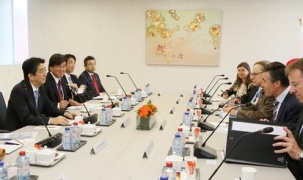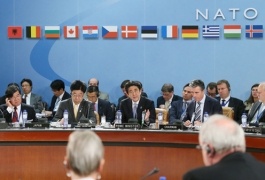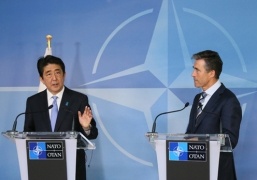Europe
Prime Minister Abe's Meeting with Mr. Anders Fogh Rasmussen, Secretary General of NATO, and Attendance at the North Atlantic Council
 (Photo: Cabinet Public Relations Office)
(Photo: Cabinet Public Relations Office)
 (Photo: Cabinet Public Relations Office)
(Photo: Cabinet Public Relations Office)
 (Photo: Cabinet Public Relations Office)
(Photo: Cabinet Public Relations Office)
Note that Prime Minister Abe had visited the NATO Headquarters in January 2007 as the first-ever Japanese prime minister that made a visit to the NATO Headquarters and this was his second visit to the NATO Headquarters as the Prime Minister of Japan.
1. Meeting with Mr. Rasmussen, Secretary General of NATO
(1) Japan-NATO relations
At the beginning, Secretary General Rasmussen welcomed the first reunion with Prime Minister Abe in one year and Prime Minister Abe's visit to the NATO Headquarters. Secretary General Rasmussen stated that he welcomed a fact that enhancement of Japan-NATO relations had been progressing.
In response to this, Prime Minister Abe stated that Japan, which takes a panoramic perspective of the world map, is a "natural partner" of NATO and the Government of Japan emphasizes cooperation with NATO from the viewpoint of practice of the "proactive contribution to peace." Prime Minister Abe also stated that the Government of Japan would specifically promote Japan-NATO cooperation as reliable partners corroborated by concrete actions on the basis of the IPCP.
Moreover, Prime Minister Abe suggested implementation of joint exercises between the Self-Defense Forces, which are staging counter piracy activities in the Gulf of Aden, and a unit participating in the NATO Operation Ocean Shield. Prime Minister Abe also suggested dispatching female government personnel from Japan to NATO Headquarters to strengthen cooperation in the field of women. Then, Secretary General Rasmussen welcomed the suggestions and stated that he would like to further enhance the partnership with Japan.
(2) Situation in a region of common interest
Secretary General Rasmussen stated medium-to long-term influence of the situation in Ukraine to Europe's security, support of Ukraine that NATO is currently providing, and support of Afghanistan by NATO beyond 2014. In response to the above, Prime Minister Abe stated that the situation in Ukraine is a global issue that also influences the security in East Asia, international order and rule of law should be respected, changes to the status quo by force or coercion cannot be permitted, and the Government of Japan would coordinate with NATO and G7 countries on this issue.
In addition, Prime Minister Abe stated that it would be important to urge Russia to play its roles as a responsible player and the Government of Japan would cooperate with NATO for this purpose.
2. North Atlantic Council (NAC)
At the council, in addition to the participants of the summit meeting, General Knud Bartels, Chairman of the Military Committee of NATO, and permanent representatives and military representatives from 28 member countries of NATO attended.
(1) Speech by Prime Minister Abe (PDF)
Prime Minister Abe made an address for approximately 20 minutes in which he, looking back at the past seven years, stated that the new security policies of Japan and NATO's "comprehensive approach" are highly compatible and NATO is a natural partner for implementing the "proactive contribution to peace." Prime Minister Abe also stated that for Japan, which takes a panoramic perspective of the world map, NATO is a "reliable natural partner" corroborated by concrete actions and the Government of Japan would specifically promote Japan-NATO cooperation on the basis of the IPCP.
Participants including Secretary General Rasmussen listened to the Prime Minister carefully throughout his speech.
(2) Exchange of opinions with permanent representatives from NATO member countries
Following Prime Minister Abe's speech, Prime Minister Abe and permanent representatives from NATO member countries exchanged opinions for approximately 30 minutes. Representatives of each country welcomed Prime Minister Abe's second visit to NATO Headquarters and highly appreciated his speech. Moreover, many of the permanent representatives appreciated the efforts by Japan under the policy of proactive contribution to peace and expressed their gratitude and expectation toward cooperation in Afghanistan, expectation toward continuation and expansion of cooperation in maritime security including counter piracy, and expectation toward expansion of Japan-NATO relations on the basis of the IPCP. Finally, Secretary General Rasmussen stated that the second speech in the North Atlantic Council expressed Prime Minister Abe's commitment to enhancement of Japan-NATO relations and finished off the North Atlantic Council.
3. Outcome documents
(1) Individual Partnership and Cooperation Programme between Japan and NATO (IPCP) (PDF)
IPCP is a document serving as guiding principles for future Japan-NATO cooperation and was signed by Prime Minister Abe and Secretary General Rasmussen on May 6.
(2) Outcome document of Japan-NATO Joint Study Group on Humanitarian Assistance and Disaster Relief (PDF)
The "Japan-NATO Joint Study Group on Humanitarian Assistance and Disaster Relief," which was established between Secretary General Rasmussen and Prime Minister Abe on the occasion of Secretary General's visit to Japan in 2013, held a total of three meetings and compiled an outcome document.


 (Open a New Window)
(Open a New Window)